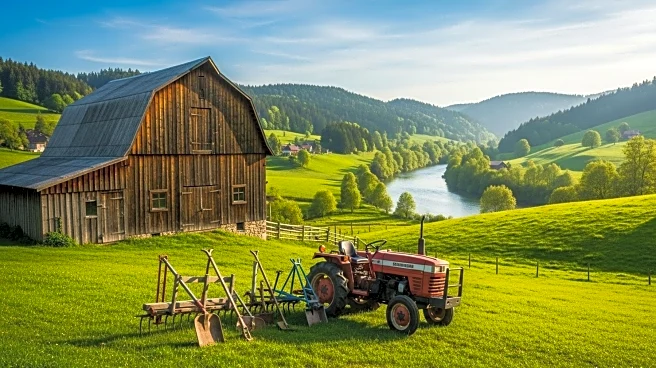What is the story about?
What's Happening?
The United States Department of Agriculture (USDA) has emphasized the significant role small farms play in the U.S. food system and rural economy. According to Faith Parum, an economist at the American Farm Bureau Federation, small farms are defined by the USDA as operations earning less than $350,000 in gross cash farm income annually. Despite this, many small farms face high expenses, often exceeding $200,000, leaving them with an average net income of about $45,000. The USDA data reveals that approximately 86 percent of U.S. farms are classified as small based on income, and 97 percent are family-owned. These farms contribute to local economies by creating jobs, generating revenue, and supporting essential services such as schools and hospitals. They are vital to sustaining rural communities, providing fresh food, preserving traditions, and maintaining the vibrancy of rural areas.
Why It's Important?
Small farms are crucial to the U.S. agricultural landscape and rural community life. They not only produce food but also support local economies by providing employment and revenue, which are essential for maintaining community services. The high percentage of family-owned farms underscores the importance of these operations in preserving cultural traditions and ensuring the continuity of rural lifestyles. The economic challenges faced by small farms, such as high operational costs, highlight the need for supportive policies and initiatives to sustain their contributions to the economy and community life. Their role in maintaining the nation's food supply and rural culture is vital for future generations.
What's Next?
The continued support and development of small farms are essential for the sustainability of rural communities. Policymakers and agricultural organizations may focus on creating initiatives that address the financial challenges faced by small farms, ensuring they remain viable and continue to contribute to local economies. Efforts to enhance the profitability and operational efficiency of small farms could be prioritized, potentially involving technological advancements and access to resources. The USDA and other stakeholders might explore strategies to bolster the resilience of these farms against economic pressures.
Beyond the Headlines
The role of small farms extends beyond economic contributions; they are integral to the cultural and social fabric of rural America. Their preservation of traditions and community values is crucial in maintaining the identity and vibrancy of rural areas. The challenges faced by small farms, such as financial constraints, also raise ethical considerations regarding the support and protection of these essential community pillars. Long-term shifts in agricultural practices and policies could be influenced by the need to sustain small farms, impacting the broader agricultural industry and rural development.















